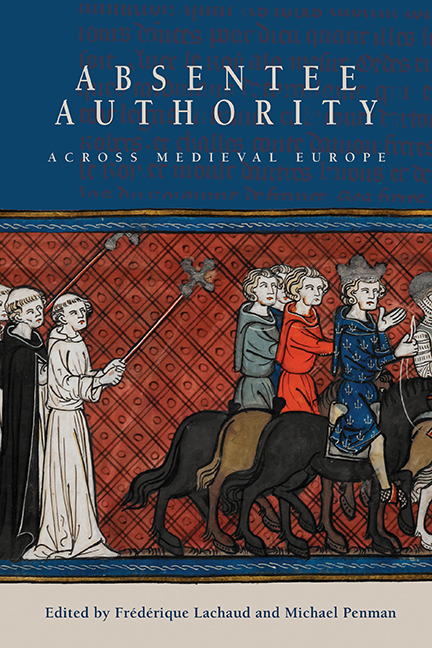Book contents
- Frontmatter
- Contents
- List of Illustrations
- List of Contributors
- Acknowledgements
- List of Abbreviations
- Introduction: Absentee Authority across Medieval Europe
- 1 Incarnating Authority, Exercising Authority: The Figure of the King in the Merovingian Era
- 2 ‘Ubi armae ibi princeps’: Medieval Emblematics as the Real Presence of the Prince
- 3 While the Bishop's Away …: Absentee Bishops of Parma during the Investiture Contest
- 4 An Inconceivable Absence: Usurpers and Illegitimate Rulers in the Genealogical Rolls of the Kings of England, from the Late Thirteenth to the Early Fifteenth Centuries
- 5 Local Loyalty and Absentee Authority in Thirteenth-Century Normandy: The Evidence of the Querimoniae Normannorum (1247)
- 6 Representation and Authority in Thirteenth-Century England and Gascony
- 7 Internal Exiles: Exclusion from the Fourteenth-Century English Court and Kingdom
- 8 ‘Si grant charté a Paris … par defaulté du roy’: Governmental Practice and the Customary Geography of the Absence and Presence of the King in France (1364–1525)
- 9 Was the Couple a Palliative to the Absence of the Prince? The Political Role and Influence of Margaret of Flanders during the Reign of Philip the Bold, Duke and Count of Burgundy (1384–1404)
- 10 Guardian – Lieutenant – Governor: Absentee Monarchy and Proxy Power in Scotland's Long Fourteenth Century
- 11 Absentee Authority in Late Medieval Iceland, as Viewed from the Literary Sources
- 12 Representatives of Kings and ‘Kings’ as Representatives: Authority and its Representation in Professional Groups in Late Medieval and Early Modern France – the Example of the King of Minstrels and of the King of Mercers
- Index
9 - Was the Couple a Palliative to the Absence of the Prince? The Political Role and Influence of Margaret of Flanders during the Reign of Philip the Bold, Duke and Count of Burgundy (1384–1404)
Published online by Cambridge University Press: 16 May 2018
- Frontmatter
- Contents
- List of Illustrations
- List of Contributors
- Acknowledgements
- List of Abbreviations
- Introduction: Absentee Authority across Medieval Europe
- 1 Incarnating Authority, Exercising Authority: The Figure of the King in the Merovingian Era
- 2 ‘Ubi armae ibi princeps’: Medieval Emblematics as the Real Presence of the Prince
- 3 While the Bishop's Away …: Absentee Bishops of Parma during the Investiture Contest
- 4 An Inconceivable Absence: Usurpers and Illegitimate Rulers in the Genealogical Rolls of the Kings of England, from the Late Thirteenth to the Early Fifteenth Centuries
- 5 Local Loyalty and Absentee Authority in Thirteenth-Century Normandy: The Evidence of the Querimoniae Normannorum (1247)
- 6 Representation and Authority in Thirteenth-Century England and Gascony
- 7 Internal Exiles: Exclusion from the Fourteenth-Century English Court and Kingdom
- 8 ‘Si grant charté a Paris … par defaulté du roy’: Governmental Practice and the Customary Geography of the Absence and Presence of the King in France (1364–1525)
- 9 Was the Couple a Palliative to the Absence of the Prince? The Political Role and Influence of Margaret of Flanders during the Reign of Philip the Bold, Duke and Count of Burgundy (1384–1404)
- 10 Guardian – Lieutenant – Governor: Absentee Monarchy and Proxy Power in Scotland's Long Fourteenth Century
- 11 Absentee Authority in Late Medieval Iceland, as Viewed from the Literary Sources
- 12 Representatives of Kings and ‘Kings’ as Representatives: Authority and its Representation in Professional Groups in Late Medieval and Early Modern France – the Example of the King of Minstrels and of the King of Mercers
- Index
Summary
Without doubt one of the main weaknesses of the ‘Burgundian State’ which was progressively built up by the Valois dukes of Burgundy was its dual structure: only the person of the prince could warrant its unity. In this specific political context, the physical absence of the dynast was a real source of vulnerability. The first Valois duke, Philip the Bold (1363–1404), was all the more ‘absent’ since his political and dynastic ambitions often kept him in Paris, at the heart of royal government. This evolution became even more marked in the 1390s. At that time the governmental partnership formed by the princely couple – Duke Philip and his wife, the heiress Margaret of Flanders – seems to have been, on a daily basis and on the ground, an efficient palliative to the physical absence of the prince.
Two cases concerning the practice of power in the Comté of Burgundy should enable us to test the efficiency as well as the ideological and structural limits of this singular political construct. In order to do so we shall stress the problems linked to the circulation of information and to decision-making within the Burgundian state.
In absentia: The Absence of the Prince in the Specific Context of the Burgundian State
The geography and structure of the Burgundian State of the Valois dukes were obviously a source of fragility. Two blocks co-existed: the northern territories and the possessions which are properly termed Burgundian. The duke's demesnes were undergoing a process of extension but they remained badly connected and only the person of the prince gave them some unity. Circumstances, however, meant that the duke was only occasionally present in each of the areas composing this motley assemblage. This was particularly true in the case of Philip the Bold, whose role in the central government of the kingdom required his constant presence in the capital, especially in the troubled context created by the illness of Charles VI from the summer of 1392. As a son, brother and uncle of kings, Philip the Bold was naturally close to the young Charles; this was not the case with his son, John the Fearless, whose rank was only that of first cousin of the king.
- Type
- Chapter
- Information
- Absentee Authority across Medieval Europe , pp. 171 - 190Publisher: Boydell & BrewerPrint publication year: 2017



